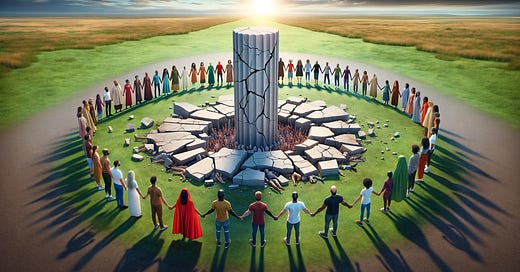Welcome to our comprehensive blog series where we explore each of the 15 pillars of supremacy culture. Last week I shared “Decoding the Framework of Supremacy Culture” as an entry point into your decolonization journey and understanding. As a dedicated decolonization counselor and educator, I'm here to guide you through understanding and challenging these pillars. Today, we're starting with a particularly isolating pillar: "I'm the Only One." This mindset can limit our collective potential and foster a sense of unnecessary competition. Let’s dive in to understand and overcome it together. Please remember that this is grief work this is truama work, and you must make space for your healing during this journey.
Introduction: Recognizing the Pillar
Understanding “I’m the Only One”
This pillar is entrenched in the belief that one person holds unique abilities or knowledge, making them indispensable in specific tasks or decisions. It’s a mindset that not only overburdens the individual but also undervalues the collective skills within a group. This can create a bottleneck in collaborative environments, as it centralizes knowledge and skills in one individual, often leading to burnout and reduced group efficacy.
Understanding the Impact
How "I'm the Only One" Shapes Environments
This mindset not only puts undue pressure on the individual who feels they must handle everything but also disempowers others. It inhibits the development of a collaborative and learning-focused culture, where skills and knowledge are shared and cultivated collectively.
The Isolation of “I’m the Only One”
How It Manifests in Our Lives
In workplaces, this can manifest as a single person taking on excessive responsibilities, believing they are the only one capable of handling them. In communities, it might appear as a specific individual always leading initiatives, hindering collaborative efforts and diverse leadership.
In homes, it might manifest as one family member managing all household tasks or making all major decisions, potentially leading to stress and resentment. This also feeds into paternalism and the patriarchy as well as arbitrary gender roles. In friendships and partnerships, this mindset can create imbalances, where one person feels solely responsible for the relationship's health or success.
The Impact on Growth and Equity
Understanding the Broader Consequences
This mentality stifles the growth and development of others, as it doesn't allow space for shared learning and leadership. It also perpetuates a hierarchy where only certain people are seen as capable or knowledgeable, leading to unequal power dynamics.
This mindset not only puts undue pressure on the individual who feels they must handle everything but also disempowers others. It inhibits the development of a collaborative and learning-focused culture, where skills and knowledge are shared and cultivated collectively.
The Psychology Behind the Pillar
Exploring the Need for Control and Recognition
Often, "I'm the Only One" stems from a deep-seated need for control or recognition. Understanding this psychological underpinning is crucial in addressing why individuals may cling to this belief and how it can be gently challenged and reshaped.
Acknowledging and adressing this pillar allows us to gently shift away from this isolating mindset, promoting a healthier, more collaborative approach to our relationships and responsibilities.




